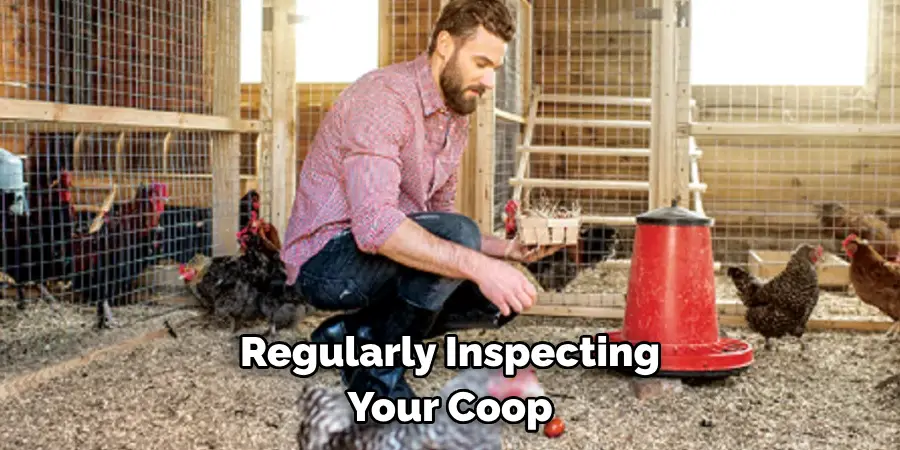Laying eggs on the ground can be a common problem for chicken owners. Not only can it lead to dirty and damaged eggs, but it can also attract predators and disease. As responsible chicken keepers, it is important to take steps to prevent our chickens from laying eggs on the ground.

The main advantage of preventing chickens from laying eggs on the ground is that it helps to maintain proper hygiene and cleanliness in the chicken coop. When eggs are laid on the ground, they can easily become dirty or cracked, making them unsuitable for consumption. You can find step-by-step instructions on how to stop chickens from laying eggs on the ground in this blog article.
Step-by-step Instructions for How to Stop Chickens From Laying Eggs on the Ground
Step 1: Inspect Your Coop
Regularly inspecting your coop is crucial to prevent chickens from laying eggs on the ground. Look for any holes, gaps, or openings in your coop where chickens could potentially lay their eggs. Seal these areas off to prevent access.
Step 2: Provide Adequate Nesting Boxes
Chickens need a designated area to lay their eggs, known as a nesting box. Make sure to provide enough nesting boxes for your chickens, with at least one box for every four hens. The boxes should be dark and quiet, mimicking the environment of a natural nest.
Step 3: Keep the Nesting Boxes Clean
Chickens will avoid laying eggs in dirty and unclean nesting boxes. Regularly clean out any soiled bedding, droppings, or broken eggs from the boxes. This will encourage chickens to lay their eggs in a clean and safe environment.
Collecting eggs daily not only ensures that they are fresh but also prevents chickens from getting used to laying eggs in a certain area. Make it a habit to check for and collect any eggs laid on the ground to discourage this behavior.

Step 4: Use Fake Eggs
Placing fake eggs in nesting boxes can help train chickens to lay their eggs in designated areas. These fake eggs can be made from golf balls or even wooden or ceramic eggs. Chickens will see these as real and will be more likely to lay their eggs there.
Providing a comfortable and soft surface for chickens to lay their eggs on can also discourage them from laying on the ground. Add bedding such as straw, hay, or shredded paper to the nesting boxes to make them more appealing.
Step 5: Provide Roosting Bars
Chickens naturally prefer roosting off the ground. By providing roosting bars in your coop, chickens will have a designated place to sleep and feel safe. This can also prevent them from laying eggs on the ground.
Allowing chickens to roam freely outside of their coop for extended periods may lead to them laying eggs on the ground. To prevent this, limit their time outside and provide plenty of opportunities for them to lay eggs in their designated nesting boxes.

Step 6: Train Your Chickens
Consistently train your chickens to lay their eggs in the nesting boxes instead of on the ground. This can be done by gently placing them in the boxes or using treats to lure them inside. With patience and consistency, they will learn where to lay their eggs.
If despite your efforts, chickens continue to lay eggs on the ground, promptly remove them. Leaving these eggs in place will signal to the chickens that it is an acceptable place to lay eggs. By removing them, you are reinforcing the idea that nesting boxes are the only appropriate place for egg-laying.
In addition to these steps, it’s important to also consider the health and well-being of your chickens when trying to prevent them from laying eggs on the ground. Make sure they have a balanced diet and access to fresh water at all times.

Safety Tips for How to Stop Chickens From Laying Eggs on the Ground
- Provide a Clean and Comfortable Nesting Area – Chickens typically lay eggs in a designated area called the nesting box. Make sure to regularly clean out the nesting boxes and provide fresh bedding such as straw or wood shavings. This will encourage them to lay their eggs there instead of on the ground.
- Install Fake Eggs or Golf Balls in the Nesting Boxes – Chickens are creatures of habit and will often lay their eggs where they see other eggs. Placing fake eggs or golf balls in the nesting boxes can trick them into thinking it’s a safe and suitable place to lay their eggs.
- Ensure Proper Nutrition – A well-balanced diet is crucial for healthy egg production in chickens. Make sure your chickens have access to a high-quality layer feed that is rich in calcium. A lack of calcium can cause chickens to lay thin-shelled eggs which are more likely to break on the ground.
- Collect Eggs Frequently – Make it a habit to collect eggs from the nesting boxes at least once or twice a day. This not only ensures that you have fresh eggs but also discourages chickens from laying on the ground.
- Provide Ample Space – Overcrowding can cause stress and lead to egg-laying issues in chickens. Make sure your flock has enough space in their coop and run to move around comfortably.
- Consider Using Decoys – If your chickens have a favorite spot for laying eggs on the ground, consider placing fake predators such as plastic snakes or owls in that area. This can scare them away and discourage them from laying there.
- Train Your Chickens – Chickens are intelligent animals and can be trained to lay eggs in specific places. Use treats or rewards to train them to lay their eggs in the nesting boxes instead of on the ground.

In addition to these safety tips, it’s important to regularly check for any health issues that may be causing your chickens to lay eggs on the ground. Providing a clean and stress-free environment, as well as spending time observing your flock, can help you identify any potential health concerns early on.
The Importance of Proper Nesting Habits for Chicken Egg Health
As we have discussed, proper nesting habits play a crucial role in maintaining the health and productivity of chicken eggs. In this section, we will delve deeper into why nesting habits are so important for chicken egg health. Firstly, when a hen lays an egg, it is coated with a protective layer known as the “bloom”. The bloom acts as a barrier against bacteria and other contaminants, keeping the egg safe until it is ready to be hatched or consumed. When a hen does not have proper nesting habits, such as laying eggs on the ground or in unclean areas, the bloom can easily be damaged or removed, leaving the eggs vulnerable to bacteria and potential contamination.
Moreover, proper nesting habits also ensure that eggs are laid in a suitable and comfortable environment. When hens have access to clean, dry, and private nesting boxes, they are more likely to lay eggs with strong shells and high quality yolks. On the other hand, if hens are forced to lay in unsuitable or crowded areas, the stress can lead to poor egg quality and an increased risk of cracked or damaged shells.
Furthermore, proper nesting habits can also have a positive impact on the behavior and well-being of hens. When hens have access to comfortable and secluded nesting areas, they are less likely to become agitated or stressed, leading to a calmer and more content flock. This can also result in increased egg production, as happy and healthy hens tend to lay more eggs.
Monitoring and Addressing Health Issues
Health issues are a common occurrence in our lives. From minor infections to chronic diseases, health problems can significantly impact our quality of life. Therefore, it is essential to monitor and address these issues before they become severe.
The Importance of Monitoring Health Issues
Monitoring health issues plays a crucial role in maintaining good health. It involves regularly checking for any changes or abnormalities in our physical and mental well-being. By doing so, we can detect and address health issues early on, preventing them from developing into more serious conditions.

How to Monitor Health Issues
Monitoring health issues can be done in various ways, including:
- Self-monitoring: This involves paying attention to our body’s signals and symptoms and seeking medical advice when needed.
- Regular Check-ups: Scheduling routine check-ups with a doctor or healthcare provider can help identify any underlying health issues.
- Medical Tests: These include blood tests, imaging scans, and other diagnostic tests that can detect health problems at an early stage.
Addressing Health Issues
Once a health issue has been identified, it is essential to take the necessary steps to address it. This may include:
- Following a Treatment Plan: Whether it is through medication, therapy, or lifestyle changes, following a treatment plan prescribed by a healthcare professional can help manage and improve the condition.
- Making Healthy Lifestyle Choices: Maintaining a balanced diet, exercising regularly, and avoiding harmful substances like tobacco and excessive alcohol consumption can also help address health issues.
- Seeking Support: Coping with a health issue can be challenging, and seeking support from friends, family, or support groups can make the journey more manageable.
Healthcare professionals play a vital role in monitoring and addressing health issues. They have the knowledge, skills, and resources to identify health issues, provide treatment and support, and guide individuals towards better overall health. It is essential to seek medical advice from a healthcare professional whenever necessary.
Promoting Overall Health and Preventing Future Issues
In addition to monitoring and addressing current health issues, it is crucial to take steps towards promoting overall health and preventing future problems. Some ways to do so include:
- Maintaining Good Hygiene: Practicing good hygiene habits, such as washing hands regularly and keeping personal belongings clean, can prevent the spread of infections.
- Getting Vaccinated: Vaccinations can protect against various diseases and help build immunity.
- Managing Stress: Stress can have a significant impact on our physical and mental well-being. Therefore, finding healthy ways to manage stress is essential.
- Educating Oneself: By staying informed about health issues and making healthy choices, we can prevent future health problems.
In conclusion, monitoring and addressing health issues are crucial steps in promoting overall well-being. By being proactive in our approach towards our health, we can lead healthier and happier lives. Remember to listen to your body and seek help when needed, as early detection and treatment are key in managing health issues effectively.

Seeking Professional Advice When Guidance on Addressing Complex Behavioral Issues
Behavioral issues can arise in various scenarios and can be complex to address. Whether it is dealing with a difficult colleague, managing disruptive behavior in the workplace, or addressing behavioral concerns with a loved one, seeking professional advice can be beneficial. One of the first steps in addressing any behavioral issue is recognizing that there may be an underlying problem that needs to be addressed. This could include mental health issues, personal struggles, or unresolved conflicts. Seeking professional advice can help identify the root cause of the behavioral issue and provide strategies for addressing it in a productive manner.
Professional advice can come from various sources such as therapists, counselors, coaches, or human resource professionals. It is important to find someone who has expertise in dealing with the specific type of behavioral issue you are facing.
For example, if you are struggling with managing disruptive behavior in the workplace, seeking advice from a human resource professional who specializes in conflict resolution and employee relations may be most helpful. When considering seeking professional advice, it is important to keep an open mind and be willing to listen to different perspectives.
A professional can offer an objective viewpoint and provide insights that may not have been considered before. They can also offer guidance on effective communication and problem-solving techniques.
Conclusion
In conclusion, it is important to take preventive measures to stop chickens from laying eggs on the ground. By providing a suitable nesting area, ensuring proper nutrition and environment, and implementing behavioral training, you can greatly reduce the chances of your chickens laying eggs on the ground.
Building a suitable nesting area not only encourages chickens to lay their eggs in designated spots but also helps keep them safe and clean. Providing enough nesting boxes according to the number of chickens in your flock is crucial. Additionally, make sure to keep the nesting area clean and comfortable by using proper bedding materials such as straw or wood shavings. I hope reading this post has helped you learn how to stop chickens from laying eggs on the ground. Make sure the safety precautions are carried out in the order listed.
About
Outdoor Fixes is a distinguished figure in the world of Diy design, with a decade of expertise creating innovative and sustainable Diy solutions.
His professional focus lies in merging traditional craftsmanship with modern manufacturing techniques,
fostering designs that are both practical and environmentally conscious. As the author of diy,
outdoorfixes delves into the art and science of outdoorfixes-making, inspiring artisans and industry professionals alike.
Education RMIT University
(Melbourne, Australia) Associate Degree in Design (Outdoor Fixes) Focus on sustainable design, industry-driven projects,
and practical craftsmanship. Gained hands-on experience with traditional and digital manufacturing tools, such as CAD and CNC software.
Nottingham Trent University
(United Kingdom) Bachelor’s in outdoorfixes.com and Product Design (Honors) Specialized in product design with a focus on blending creativity with production
techniques. Participated in industry projects, working with companies like John Lewis and Vitsoe to gain real-world insights.
Publications and Impact
In diy, Outdoor Fixes his insights on indoor design processes, materials, and strategies for efficient production.
His writing bridges the gap between artisan knowledge and modern industry needs, making it a must-read for both budding designers and seasoned professionals.

